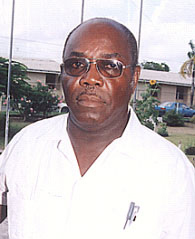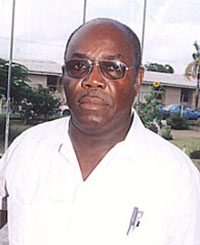Suspended Chairman of the Public Service Commission (PSC) Carvil Duncan says that the removal of free security, telephone and electricity benefits, which he had been entitled to since taking office in 2014, is politically-motivated and he plans to approach the High Court to have them restored.
Of much concern to him is the removal of the 24-hour security at his home, which according to Duncan can put him in danger. He said that while these amenities, which also include a duty-free concession, are not in black and white, they have become the norm as every Chairman before him benefited. It is for this reason that he is questioning their withdrawal.
Speaking to Stabroek News on Wednesday, Duncan said that during the first week of March he was told by one of the security guards who was assigned at his home that it was his last day there.

He said that he later got information that the Secretary of the PSC had informed the Accounts Department that the PSC will no longer be paying his utility bills. “As a result of that information, I wrote her on 10th March informing her that I am still the Chairman of the Public Service Commission. I am only suspended and not dismissed nor terminated. Hence, I am still entitled to all of the benefits that I enjoyed as Chairman until such time as the court rules different,” he said.
Duncan added that the suspension “does not in any way remove me from being the Chairman. In fact what it does is to temporary restrict me from carrying out the functions of the office.”
As a result, he asked that the directions given be revoked with immediate effect, failing which a copy of the letter will be sent to his attorneys and legal action may be taken against the Commission, which is an independent body in keeping with the Constitution.
Duncan noted that a few days later she responded and advised him that the matter would be addressed by the Commission at its next meeting.
“The only conclusion I could draw was this was not a Commission decision but a decision made at the Office of the President and filtered down to the Secretary, who carried them out,” he told this newspaper.
Duncan made it clear that he will take this matter to his lawyers. “I am challenging the Commission. I am challenging the Secretary who acted ultra vires of the Commission by taking political directives and acting on them, not realising that the Commission as an independent body …ought to have some degree of neutrality and respect,” he said before pointing out that the funding for the commission comes from the Consolidated Fund and it has to report to the National Assembly and not to a minister. Further, he stressed that those employed at the Commission are not public servants and should not be treated as such. “So for all intents and purposes the Commission ought to be independent of the politicians,” he said.
Duncan emphasised that based on a letter he received from President David Granger on October 10, 2016, he was only suspended as Chairman of the PSC and not as a member. He stressed that he had been given two instruments by the then PPP/C administration; one was issued to him as a member of the Commission on September 1, 2014, while another was issued to him as Chairman several days later. “So the question arises: Why am I not being invited to attend commission meetings? And that question still remains unanswered,” he said.
He said that it would appear to him that the removal of his security is “a clear indication that someone is putting into practice the thought expressed—‘it’s blood on the carpet.’ If that should ever materialize then John Public is aware of who is responsible.”
Last October, Duncan had said that President David Granger, in seeking his resignation as Chairman of the PSC and from the other constitutional service commissions, had told him that he did not want “any blood on his carpet.”
The Ministry of the Presi-dency subsequently told Stabroek News that the “blood on the carpet” comment “is an idiomatic expression suggesting that he would be forced to vacate the positions he holds through legal means if he does not leave voluntarily.”






